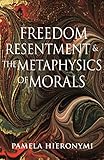Freedom, Resentment, and the Metaphysics of Morals / Pamela Hieronymi.
Material type: TextSeries: Princeton Monographs in Philosophy ; 46Publisher: Princeton, NJ : Princeton University Press, [2020]Copyright date: ©2020Description: 1 online resource (168 p.)Content type:
TextSeries: Princeton Monographs in Philosophy ; 46Publisher: Princeton, NJ : Princeton University Press, [2020]Copyright date: ©2020Description: 1 online resource (168 p.)Content type: - 9780691194035
- 9780691200972
- Free will and determinism
- PHILOSOPHY / Ethics & Moral Philosophy
- Akeel Bilgrami
- Chronicle of Higher Education
- David Hume
- Don't Confuse Technology with Teaching
- Good Place
- Harry Frankfurt
- Ludwig Wittgenstein
- Michael McKenna
- Princeton Monographs in Philosophy
- R. J. Wallace
- Responsibility and the Moral Sentiments
- Stephen Darwell
- T. M. Scanlon
- adviser
- advisor
- analytic philosophy
- analytical philosopher
- consulting philosopher
- free will
- logic
- metaphysical
- moral demands
- moral expectations
- moral standards
- philosophical consultant
- philosophy of language
- philosophy of law
- political theory
- 192 23
- B1667.S383
- B1667.S383 F7435 2021
- online - DeGruyter
- Issued also in print.
| Item type | Current library | Call number | URL | Status | Notes | Barcode | |
|---|---|---|---|---|---|---|---|
 eBook
eBook
|
Biblioteca "Angelicum" Pont. Univ. S.Tommaso d'Aquino Nuvola online | online - DeGruyter (Browse shelf(Opens below)) | Online access | Not for loan (Accesso limitato) | Accesso per gli utenti autorizzati / Access for authorized users | (dgr)9780691200972 |
Frontmatter -- Contents -- Preface -- Primer on Free Will and Moral Responsibility -- Introduction -- 1. Strawson's Strategy -- 2. The Resource and the Role of Statistics -- 3. The Further, Implicit Point -- 4. Addressing the Crucial Objection -- 5. The Remaining Objections -- Conclusion -- P. F. Strawson, "Freedom and Resentment" -- Acknowledgments -- Bibliography -- Index -- A NOTE ON THE TYPE
restricted access online access with authorization star
http://purl.org/coar/access_right/c_16ec
An innovative reassessment of philosopher P. F. Strawson's influential "Freedom and Resentment"P. F. Strawson's 1962 paper "Freedom and Resentment" is one of the most influential in modern moral philosophy, prompting responses across multiple disciplines, from psychology to sociology. In Freedom, Resentment, and the Metaphysics of Morals, Pamela Hieronymi closely reexamines Strawson's paper and concludes that his argument has been underestimated and misunderstood.Line by line, Hieronymi carefully untangles the complex strands of Strawson's ideas. After elucidating his conception of moral responsibility and his division between "reactive" and "objective" responses to the actions and attitudes of others, Hieronymi turns to his central argument. Strawson argues that, because determinism is an entirely general thesis, true of everyone at all times, its truth does not undermine moral responsibility. Hieronymi finds the two common interpretations of this argument, "the simple Humean interpretation" and "the broadly Wittgensteinian interpretation," both deficient. Drawing on Strawson's wider work in logic, philosophy of language, and metaphysics, Hieronymi concludes that his argument rests on an implicit, and previously overlooked, metaphysics of morals, one grounded in Strawson's "social naturalism." In the final chapter, she defends this naturalistic picture against objections.Rigorous, concise, and insightful, Freedom, Resentment, and the Metaphysics of Morals sheds new light on Strawson's thinking and has profound implications for future work on free will, moral responsibility, and metaethics.
Issued also in print.
Mode of access: Internet via World Wide Web.
In English.
Description based on online resource; title from PDF title page (publisher's Web site, viewed 26. Mai 2021)


